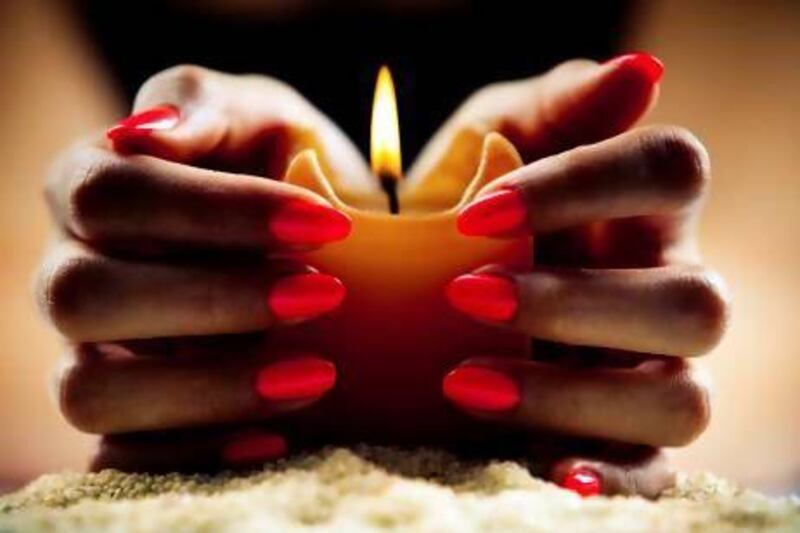If there's a universal beauty grief for Muslim women, it's nail polish.
According to Islam, impermeable polish on one's nails invalidates wudu, or the washing that precedes prayers.
So it's not surprising that the recent introduction of a so-called "halal" option has been met with joy by Muslim women living around the world.
The Polish beauty brand Inglot has captured attention with its new O2M - oxygen and moisture - range. Allegedly porous and breathable, the polish is designed to allow water vapour to penetrate to the nail surface, making it suitable for ablutions.
Cue the social media excitement - and censure.
One Twitter user, @MarwaSammi, summarised it well: “Halal nailpolish. [sic] Bismillah and mashallah and all other holy words, this is exciting.
Maria Kari, writing on a blog for Pakistan's The Express Tribune, echoed the sentiment of many Muslim women: "I'm not ashamed to admit that discovering O2M Breathable polishes constitutes the entire sum of my current happiness."
The controversy comes from some of the more devout, who argue its permissibility. While the Quran does not specifically address the issue of nail polish, some religious scholars say water must touch the surface of the nail for wudu to be done correctly, and have deemed nail polish a no-no at any time.
Conflicting fatwas were swift to follow, as were the independent tests done by enterprising bloggers who wanted to see for themselves just how reliable the porous claim was.
Not even the American Muslim scholar Mustafa Umar escaped criticism when he tested the product and declared it permissible on www.suhaibwebb.com.
Sobia Kamran, a blogger in the US, wrote that, despite her initial excitement at Inglot's release, upon closer examination and "careful research", she dismissed it as an option for herself. She presented her findings to readers and left it up to them to decide.
The website Halaal Talk was more strident in its criticism: "Muslim women who are conscious of the importance of Salaat [prayers] and ibaadat [worships] in general should not be deceived by the 'halal' advertisement attached to this new kind of nail polish."
The range and volume of conflicting opinion prompted Maryam Khan Ansari, a reporter for the US-based digital news outlet Illume, to write that Inglot nail polish isn't revolutionary "but rather, the dialogue that has surrounded it" is.
Still, it seems many women are eager to give Inglot the benefit of the doubt. When I queried friends, the reaction was mixed. Some were cautious, if not downright suspicious, that it was truly halal. Others bought the product, wanting - and needing - it to be true.
And as is often the case, opinion sways towards disgust that something as innocuous as nail polish can cause such a stir, mainly from the "non-religious" segment. As one friend put it, she loathes "this halal nail polish idea".
For others, anything that can make the difference between prayers being accepted or denied deserves the scrutiny.
While Inglot has capitalised on the halal tag, it's not alone in the market. New water-based products pushing the "permeable" element are also available from the Canadian beauty brands Tuesday in Love and Suncoat. Or there's Acquarella, which touts itself as vegan.
The latter two emphasise natural ingredients that make them halal, rather than being halal altogether.
This highlights a broader issue. While the term "halal certified" used to apply to food groups, it is increasingly being applied to beauty products, making cosmetics and personal care products that target the Muslim market big business.
According to research from Dr Murray Hunter conducted at the University of Malaysia, the halal cosmetic and personal care market is worth between US$5 billion and $14bn (Dh18bn and Dh51bn) in Muslim-populated countries.
Meanwhile, the European cosmetics news website Cosmetics Design-Europe reported an increasing preference for natural and organic beauty and personal care products, which are considered halal-friendly.
For a product to be certified halal, it can't contain alcohol, fragrances or animal ingredients. It should also carry a guarantee that it hasn't been tested on animals.
Apparently Colgate-Palmolive is developing halal-certified cosmetic ranges, while Inglot has since indicated a desire to explore the Muslim market further. And why wouldn't they, given all the attention given to their first effort?
There's more mileage in this market, and it will be interesting to see what other halal beauty trends emerge. And while there is no arguing that the Muslim market is being commercialised, it seems that ethical - not just "wudu-friendly" - products might just be the next big thing.










